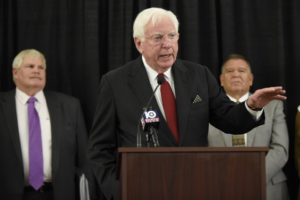
Mark White has died at the age of 77.
This man’s name might not ring as many bells as it once did, but his passing from the scene allows us to bid adieu to someone I consider to be one of Texas’s most consequential and important public servants.
White served as Texas governor for a term between 1983 and 1987. But what a term it turned out to be!
On his watch, the state enacted something that has become a blessing and a curse to educators, students and parents throughout the state. No pass-no play became law during Gov. White’s term.
Its genesis is a story all by itself.
Flash back for a moment to 1983. A Dallas billionaire, H. Ross Perot, popped off about the quality of Texas’s public education. He said the state was more interested in producing blue-chip football players than it was in producing blue-chip scholars.
That message got quickly to White’s desk, and to the governor himself. I’m just guessing about this, but my hunch is that Perot’s remarks angered the governor.
He called Perot out. He said, in effect, “OK, buster, if you think you can do a better job of crafting public education policy, then why don’t you lead a blue-ribbon commission to craft one? You can present it to the people of Texas, and then to the Legislature, and we’ll see if it works.”
Perot accepted the challenge. The Perot Commission met for weeks and came up with no pass-no play. Perot then took off on a barnstorming tour of the state to sell it. I arrived in Beaumont in the spring of 1984 and Perot came to Beaumont to make his pitch. Suffice to say that Perot could command a room in a major way.
White then summoned the Legislature to Austin for a special session and it enacted the no pass-no play legislation, known as House Bill 72. It changed fundamentally the way Texas educates its public school students.
Here’s the Texas Tribune story on White’s death.
HB 72 has taken many forms in the 30-plus years since its enactment. The framework remains essentially the same: students have to pass certain mandated tests in order to advance to the next grade and then to graduate from high school.
HB 72’s success has been a matter of intense debate ever since.
White is the last former Democratic governor to pass from the scene in Texas. “Mark’s impact on Texas will not soon be forgotten, and his legacy will live on through all that he achieved as Governor,” the current governor, Republican Greg Abbott, said in a written statement.
I’ll go along with former Lt. Gov. Bill Hobby, who served with Gov. White, and who described White as “one of Texas’s greatest governors.”
The very notion of enacting such a huge overhaul of the state’s public education system puts Gov. White on a pedestal he need not share with anyone.








